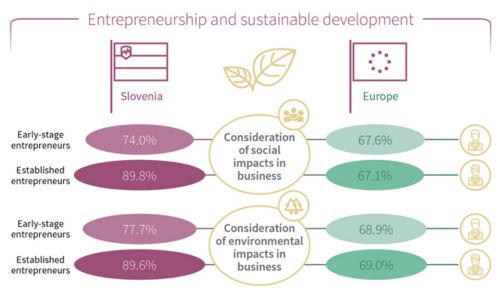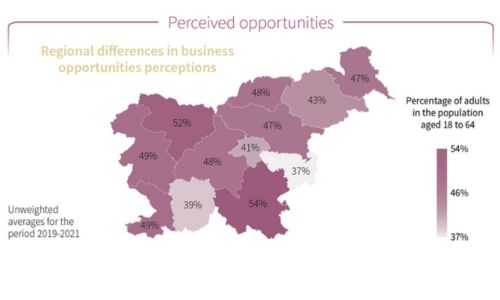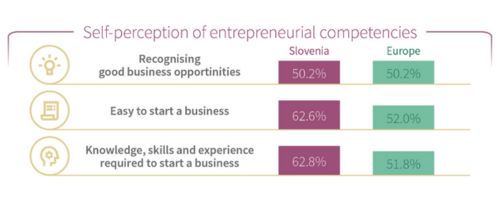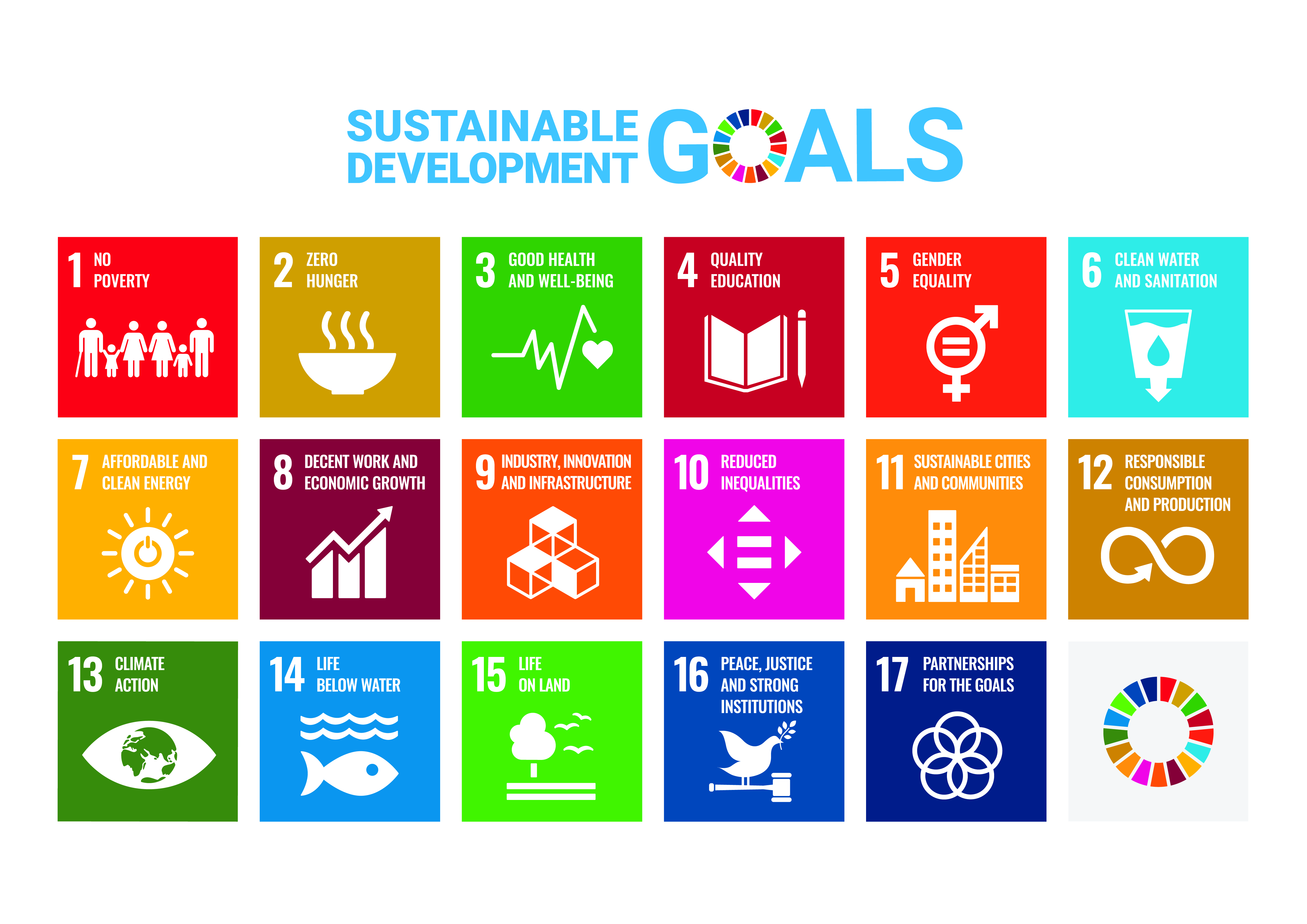Entrepreneurs in Slovenia are increasingly integrating sustainability into their business models, according to the GEM 2023 Slovenia National Report.
Among early-stage entrepreneurs, 24.9% are aware of the Sustainable Development Goals (SDGs), which is higher than among established entrepreneurs (20.1%). This indicates a greater awareness and better education of young people. In addition, Slovenian companies are also actively considering the social and environmental implications of their decisions, thus outperforming the European average.

Prof. Dr. Barbara Bradač Hojnik, co-author of the study, said: "The focus on social responsibility and the balancing of ethical principles and financial objectives reflect a specific corporate practice in Slovenia. At the same time, it highlights the potential for sustainable growth and digital transformation, which continue to drive the competitiveness and development of the Slovenian economy. It is therefore crucial to continue to support entrepreneurship through targeted measures for socially responsible entrepreneurship, the transfer of family businesses, the promotion of growth and employment and the acceleration of digital transformation."
Established businesses on the rise
With a Total Early-stage Entrepreneurial Activity (TEA) rate of 7.07% in 2023, Slovenia lags behind the average of GEM global and European countries. TEA, which covers both nascent and new entrepreneurs, reflects the lower participation in the early-stage stages of entrepreneurship and highlights the need to further support start-ups.
However, in 2023, there was an increase in the share of established entrepreneurs from 8.09% to 8.84%, indicating a greater stability and resilience of businesses that survive the initial challenges.
Prof. Dr. Karin Širec, Head of GEM Slovenia explained: "Although early-stage entrepreneurial activity was lower compared to the European average, we have seen significant progress in the stability and growth of established businesses. This underlines the need to strengthen targeted support measures to encourage the start-up of new businesses while supporting the growth and innovation of existing ones. Tailored mentoring, training and financing programmes will be key. We also want to stress the importance of diversity, inclusiveness and adaptability to rapidly changing market demands, which will contribute to increased competitiveness and sustainable growth."
Analysis of regional data reveals considerable diversity between regions, reflecting different economic, social and geographical conditions and underlining the need for targeted development approaches. Regional differences in Slovenia in terms of how attentive people are to the existence of business opportunities in their environment are shown in the graphic below. The Gorenjska region and the southeastern Slovenia region stand out with a value above the Slovenian average, while the other regions are close to the Slovenian average. At the other end of the scale are the Primorje-Notranjska and Posavje regions, where on average less than four out of ten adults perceive business opportunities in their environment.

Innovation and internationalization
The international orientation of Slovenian entrepreneurs remains a key factor in the dynamics of entrepreneurship. Due to a small domestic market, more entrepreneurs in Slovenia are turning to international markets to ensure their global competitiveness. At the same time, 22.8% of early-stage entrepreneurs in 2023 expressed plans for their company to employ more than five people in the next five years, further underlining their ambitions for growth and expansion.
Almost half (47%) of early-stage entrepreneurs plan to digitise their business processes, which puts Slovenia above the European average. This high level of readiness to integrate new technologies shows that Slovenian entrepreneurs are proactive in adapting to modern trends.
Entrepreneur profile and success factors
In 2023, Slovenia boasted a diverse and dynamic set of entrepreneurs, varying in demographics, education and income status. The profile of Slovenian entrepreneurs shows a broad representation of different age groups, with the highest level of early-stage entrepreneurial activity (TEA) among individuals aged 25-34. The majority of early-stage entrepreneurs have a college or university degree, underlining the importance of academic knowledge in today's competitive business world.
The data also show that there are significant shifts in the income structure of the entrepreneurial population, with an increase in the share of early-stage entrepreneurs in the top third of income brackets, reflecting the success of entrepreneurial endeavours or better access to capital and markets during the period under study.
The adult population shows a markedly positive attitude towards entrepreneurship as a career, with an average of 66.86%, which puts Slovenia well above the European average (60.42%). Moreover, the respect for successful entrepreneurs and the support of the media further strengthens the entrepreneurial culture.
The self-perception of entrepreneurial competences among Slovenians is also high, with 62.8% of the population believing that they have the knowledge, experience and skills needed to succeed in entrepreneurship, which is above the GEM average (60.9%) and the European average (51.8%). This confidence is underpinned by the relatively high percentage of people, 62.6%, who think that starting a business is easy.

The impact of the ecosystem and policies on entrepreneurial activity
With a NECI value of 4.8, Slovenia remains in the top third of GEM participating countries. Compared to the average of European countries and all GEM countries, Slovenia has achieved a minimal advantage in terms of NECI value, which indicates competitiveness in the business environment and represents a solid basis for further development.
Report co-author Prof. Dr. Katja Crnogaj stated: "According to the national experts, Slovenia continues to gradually improve its entrepreneurial environment. Centralisation of government support would be an important next step. Encouraging public-private partnerships and strengthening the innovation ecosystem through increased investment in research and development point the way towards a dynamic and competitive economy. To put Slovenia at the forefront of best practices in the region, it is important to balance all three elements of the entrepreneurial ecosystem: an enabling regulatory environment, comprehensive contextual support and easier access to finance for start-ups and SMEs.”
Access the Executive Summary in English and the full GEM 2023 Slovenia National Report in Slovenian.
GEM Slovenia is carried out by the Institute for Entrepreneurship and Small Business Management at the Faculty of Economics and Business at the University of Maribor. The Slovenian research team consists of Prof. Dr. Karin Širec (leader), Prof. Dr. Polona Tominc, Prof. Dr. Katja Crnogaj, Prof. Dr. Barbara Bradač Hojnik, Assoc. Prof. Dr. Ivona Huđek, Mag. Matej Rus and Prof. Miroslav Rebernik, Emeritus. More information is at the Institute of Entrepreneurship and Small Business Management website: http://ipmmp.um.si/.
Further information:
Prof. Dr. Karin Širec, Faculty of Economics and Business, University of Maribor, Institute for Entrepreneurship and Small Business Management, Contact: karin.sirec@um.si.

